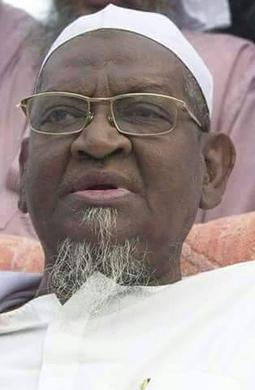
Syed Fazlul Karim was an Islamic scholar and politician. He was the founder of Islami Andolan Bangladesh, and founded a residential madrassah in Charmonai, Barisal, southern Bangladesh.
Abdul Latif Chowdhury, widely known as Saheb Qiblah Fultali, was a late-twentieth century Bangladeshi Islamic scholar, mufassir, qāriʾ, poet and orator. As a prolific author, he completed several works in Arabic, Bengali and Urdu including Muntakhab as-Siyār and Anwar as-Sālikīn. His books are part of syllabic studies under the Bangladesh Madrasah Education Board. Fultali was the leading figure of the Islamic Arabic University movement and the demand for fazil and kamil qualifications to be recognised as bachelor's and master's degrees. He is the founder of several influential organisations and institutions in Bangladesh and the United Kingdom such as Anjumane Al Islah, Hazrat Shahjalal Darussunnah Yaqubia Kamil Madrasa and Madrasah-e-Darul Qirat Majidiah.

Shams al-Ḥaqq ibn Muḥammad ʿAbd Allāh ibn Chirāgh ʿAlī al-Farīdfūrī, or simply known as Shamsul Haque Faridpuri was an Islamic scholar, educationist, and social reformer. He was the founder-principal of Jamia Qurania Arabia Lalbagh. He also founded many other madrasas. Organisations which he initiated include; Khademul Islam Jamat and Anjuman-e-Tabligh-al-Quran.

Islami Andolan Bangladesh, abbreviated as IAB, is a major Deobandi Islamist political party in Bangladesh. It was founded in 1987 by Fazlul Karim as Islami Shashontantra Andolan, and took its current name in 2008. The party maintains distance from both of the dominant parties in Bangladesh, Awami League and Bangladesh Nationalist Party. In the recent years, the party has gradually done well in the local government elections. The number of votes of the party has increased also in the national polls.

Ubaidul Haq, also spelt Obaidul Haq, was a Bangladeshi teacher, muhaddith, mufassir and writer. He was the former khatib of the national mosque of Bangladesh.
Muhammad Sulṭān Zauq Nadwī is a Bangladeshi Islamic scholar, author and the founder of Jamiah Darul Ma'arif Al-Islamia. Member of the International Union of Muslim Scholars (IUMS). He is known mainly for his expertise in and contribution to Arabic language and literature.

Syed Muhammad Rezaul Karim, also known by his title Charmonai Pir, is a Bangladeshi Deobandi Islamic scholar, politician, religious speaker and social reformer who serving as the second leader of Islami Andolan Bangladesh. He is also President of the Bangladesh Mujahid Committee and Bangladesh Quran Education Board, and the Vice President of Befaqul Madarisil Arabia Bangladesh.
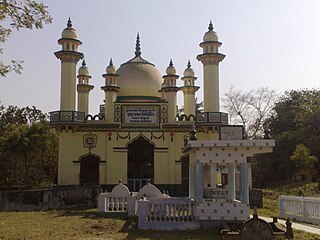
Moḥammad Abū Bakr Ṣiddīque al-Qurayshī was a Bengali Islamic scholar and the inaugural Pir of Furfura Sharif in West Bengal. He is regarded by his followers, who are scattered across eastern India and Bangladesh, as a mujaddid (reviver) of Islam in the region, due to his significant contributions in religious propagation via the establishment of mosques and madrasas, publication of newspapers and education development in neglected areas. He was the founding president of the sociopolitical Anjuman-i-Wazin-i-Bangla organisation, which advocated for causes such as the Khilafat Movement and Pakistan Movement. Siddique died in 1943, and his shrine is greatly venerated as one of West Bengal's most prominent Sufi centres.

Ḥabībullāh Qurayshī was a Bengali Islamic scholar and educationist of the Deobandi movement. He was the founding director-general of Al-Jamiatul Ahlia Darul Ulum Moinul Islam.

Mufti Azizul Haq was an Islamic scholar and social reformer from present-day Bangladesh. He was the founder of Al-Jamiah al-Islamiyyah Patiya and served as its first chancellor.

Deen Muhammad Khan (1900–1974) was a Bangladeshi Deobandi Islamic scholar and Mufassir. He was known for interpreting the Quran in Urdu. After completed his studies at Darul Uloom Deoband, he started teaching. He was one of the founders of Jamia Qurania Arabia Lalbagh. He taught for sometime in the Department of Islamic Studies at University of Dhaka and later at Government Madrasah-e-Alia. He was a politician of Jamiat Ulema-e-Islam Bangladesh.
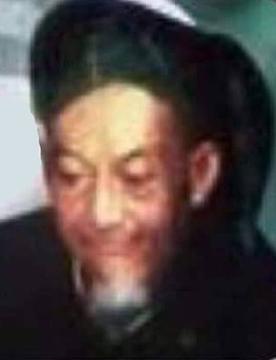
Muhammad Ibrahim Ujani was a Bengali Deobandi scholar and founder of the Jamia Islamia Ibrahimia. He was a senior disciple of Rashid Ahmad Gangohi, and his khalifa Syed Muhammad Ishaq was the founder of the Charmonai Darbar.
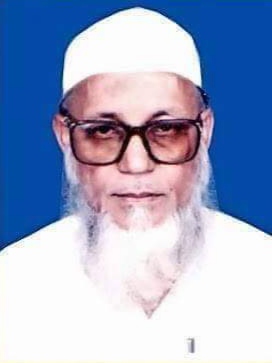
Shamsuddin Qasemi was a Bangladeshi Islamic scholar, politician, author and educationist. He was the founding president of the Khatme Nabuwwat Andolan Council, former secretary-general of Jamiat Ulema-e-Islam Bangladesh, former principal of Jamia Madania Chittagong and Jamia Hussainia Arzabad, and the founding chief-editor of the monthly Paygam-e-Haqq and weekly Jamiat magazines. He is also noted for his contributions during the Bangladesh Liberation War of 1971.

Abdul Momin Shaykh-e-Imambari was a Bangladeshi Islamic scholar, teacher and politician. He was a former president of Jamiat Ulema-e-Islam Bangladesh.
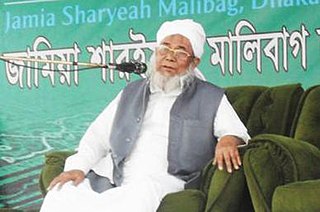
Qazi Mu'tasim Billah Bahar was a Bangladeshi Islamic scholar, teacher, author and politician. He was the principal of Jamia Shar'iyya Malibagh for over four decades, a former professor at the University of Dhaka and the founding principal of Jamia Islamia Darul Uloom Madania in Jatrabari, Dhaka. He has written many books and articles in the Bengali language and pioneered the introduction of a Bengali-medium among the Qawmi madrasas of Bangladesh.

Syed Faizul Karim is a Bangladeshi Islamic scholar and politician. He is known as Shaikh-e-Charmonai to his supporters. He is serving as Senior Vice President of Islami Andolan Bangladesh. He is also the Vice President of Bangladesh Mujahid Committee and Bangladesh Quran Education Board and Central Member of Befaqul Madarisil Arabia Bangladesh. During his student life, he served as the central president of the Islami Chhatra Andolan Bangladesh.

Nesaruddin Ahmad was a Bengali Islamic scholar, spiritual reformer, educationist and writer. He was the main disciple of Furfura Sharif's Mohammad Abu Bakr Siddique in eastern Bengal. Ahmad was the inaugural Pir of Sarsina, having founded the Sarsina Darbar Sharif and Darussunnat Kamil Madrasa in 1915, one of the largest Islamic institutions in South Bengal and the first major alia madrasah after Calcutta. Ahmad was among the leading Islamic leaders in colonial Barisal, and his influence extended across Bengal. The Nesarabad Upazila of Bangladesh has been named after him.
Maqṣūd Ullāh ibn Thanāʾ Ullāh ibn Ḥijr Ullāh al-Ghāzī, commonly known as Maqsudullah, was a Bengali Deobandi Islamic scholar best known as the inaugural Pir of Talgasia Darbar Sharif. He was a disciple of Ashraf Ali Thanwi, and founded numerous qaumi madrasas in the Greater Barisal region.

Abdul Wahhab Pirji, popularly referred to as Pirji Huzur, was a Bangladeshi Islamic scholar, author and educationist. He was a disciple of Ashraf Ali Thanwi and the founding principal of Jamia Hussainia Ashraful Uloom in Bara Katara, Dhaka.
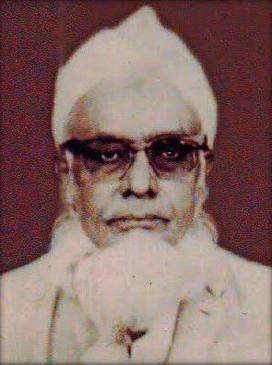
Muhammad Yunus Choudhury, popularly known as Haji Muhammad Yunus, was a Bangladeshi Islamic scholar and educationist. He was the second rector of Al Jamia Al Islamia Patiya, former president of Idarat al-Maʿarif and an active member of the Muslim World League. As the founding president of Befaqul Madarisil Arabia Bangladesh, Yunus contributed to the establishment and renovation of roughly 1500 madrasas in Bangladesh. He was awarded the title of Shaykh al-ʿArab wa al-ʿAjam by the Imam of Masjid al-Haram.

















